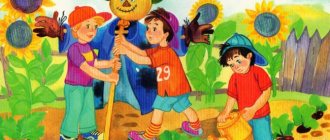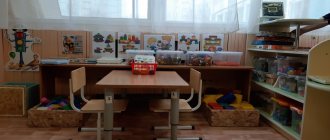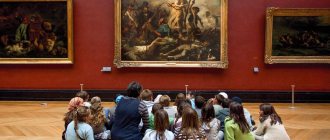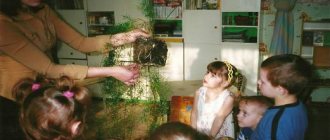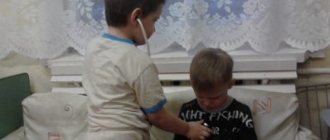When to start developing the moral qualities of a person
There is an opinion that a person’s character is formed before the age of 5 - the rest of the time it can only be adjusted. Yes, the foundation of personality is laid in early childhood, but under the influence of the immediate environment, a person’s moral qualities can undergo changes throughout his life. Another statement: how well a child is raised depends on his future fate, the opportunity to find his place in life, and the ability to become happy.
By the age of 5, a child, as a rule, is already able to evaluate his actions, separate good behavior from bad, and control his emotions.
A child will not be able to develop the necessary moral qualities and behavioral skills without the direct participation of significant adults in this process. That is, the child must be taught all this, just like counting or tying shoelaces. The closest people to preschool children, as a rule, are parents and teachers.
Spiritual and moral education of preschool children - Teplova A.B. / Educators of Russia
Stages of child moral development
Parents, educators and peers play a critical role in the development of spiritual and moral qualities, which at their core are a set of rules and expectations that determine behavior. At different stages of their development, children have different values, different points of view, and many connections that influence their moral development.
- Stage of punishment and submission. In the early stages of moral development, children are driven by the desire to avoid punishment and satisfy their needs through obedience to rules and simple choices between right and wrong.
- Stage of justice and equality. At this stage of development, children become selfish; they strive to satisfy their needs before others. Very rarely do children meet the needs of others.
- Stage of expectations and rules. With experience and help from adults, children progress to the next stage of moral development, where individual morality is shaped by interpersonal norms and the expectations of others (such as peers, teachers, and parents).
- Law and order stage. At this stage of development, behavior is characterized by obedience to the law, respect for persons in authority, and adherence to social rules and norms.
- Social contract stage. Outside of traditional ideas, appropriate behavior is based on social norms, rules and laws. However, care must be taken to ensure that individual values are not violated and that fairness is maintained.
- Stage of universal and ethical principles. Although behavior is often governed by rules, laws, and expectations, there are exceptional circumstances where independent judgment and moral reasoning may trump conventional norms in the decision-making process.
Tasks of moral education of preschool children
The spiritual and moral education of preschool children is based on several important “pillars”:
- a life principle built on goodness, the absence of sinfulness and evil;
- humane attitude towards friends and strangers;
- development of cultural skills;
- growth and harmonious development of the child as an individual.
Each of the principles involves specific work with the baby. So, in the first case, good fairy tales or Orthodox parables that children can understand, in which good certainly triumphs over evil, will help convey the necessary information.
Unobtrusive conversations, stories and examples from life will teach you to treat others humanely.
You can cultivate a craving for cultural values by first visiting nature museums with your child, and then galleries and exhibitions. If you don’t have the necessary knowledge yourself, you can take a guide who, taking into account your age, will tell you about the exhibits in an interesting and fascinating way.
Moral education of children using Russian folk tales and Soviet animation
About targets
The spiritual and moral education of preschoolers is a long-term process, after which one can notice a change in consciousness in children, as well as a developed sense of kindness towards others and the weak. The purpose of the presented explanation is to cultivate moral qualities, initially based on the foundations of cultural communication and vision, attitude towards society and even towards oneself.
We can briefly talk about the tasks of educating moral qualities in preschool children. The basis of education is the incorporation into their mentality of the concept of good and bad behavior, instilling respect for the surrounding public. Adults must explain to the child how important it is to become a worthy member of society in compliance with moral qualities and morality. Experts note that children who have mastered concepts such as a sense of friendship, kindness, love and justice have a higher level of spiritual development. They do not have problems communicating with others, they are less susceptible to various stresses. Therefore, it is necessary to begin spiritual and moral development in the family in early childhood, when the baby is most receptive to learning simple truths; they will then determine his deeds and actions.
The formation of moral qualities in preschoolers occurs with the achievement of the following tasks:
- Explaining the importance of home and family - children must understand that kindergarten, hometown and other points are their homeland, their native place, which should always be remembered.
- Fostering responsibility and a positive attitude towards living organisms and nature in general.
- Justification for respect for work - this means any work that includes such important aspects as for the benefit of oneself, for the benefit of loved ones, for the benefit of nature, and so on.
- Forming a sense of respect and interest in traditions and native craft.
- Learning basic knowledge about human rights.
- Broadening your horizons about the cities of your country.
- Getting to know the symbols of your native country.
- Fostering a sense of pride in the actions of one’s country and the moments achieved.
- Explaining the importance of a sense of respect for other peoples and countries.
The spiritual and moral education of preschool children is carried out by society - parents, relatives, educators, and teachers of the sections they attend.
How to cultivate spiritual and moral qualities, examples and recommendations
Personal example
It is known that the best method of education is personal example. Any words lose their meaning if they are not used in practice. No matter how much parents and educators talk about good behavior, respect for others and a humane attitude towards nature, if adults do not do what they talk about, then all the talk will be in vain.
For example, if dad declares that one must love animals, but he kicks away a stray kitten, then this is unlikely to be a worthy example to follow. If a mother communicates with her neighbor in the most kind way, but gives unflattering assessments behind her back, then her daughter is more likely to learn a lesson in hypocrisy and double-mindedness than a sincere attitude towards loved ones.
Moral education of preschoolers is not an easy task, and in order for your child to grow up to be a worthy person, he must copy your appropriate behavior.
Ability to share
It is extremely difficult for small children to understand why he should give, even temporarily, his favorite toy to a boy in the sandbox. The child still has no idea what generosity is, what greed is, and you shouldn’t reprimand him for it. You need to simply and unobtrusively tell how great it is when you can please another person - then you yourself will be happier, how great it is when you love not only receiving gifts, but also giving them.
A little later, the topic of “know how to share” can be expanded. Children learn that they can share not only objects, toys, and treats, but also a warm attitude, a good mood, and a smile. It is appropriate to recall the wonderful song about a smile from the cartoon.
Caring for others
It is also easier and more effective to cultivate such moral qualities as kindness and responsiveness through personal example. When children see that mom and dad love not only them, but also a disabled neighbor on the playground, that they are not capable of offending not only a person, but any living creature either by word or action, you can be sure that the kids will absorb into themselves this behavior.
At an early age, the spiritual and moral education of children through fairy tales is of invaluable importance. In particular, K.D.’s fairy tales vividly teach us to take care of others. Ushinsky “Know how to wait”, Russian folk song about a cockerel, a chicken and a bean seed, etc.
We learn the main ethical standards of a kindergartener
When already preparing your child for his first visit to kindergarten, you can teach a small but clear lesson on the topic “moral education of preschool children.”
It is possible that the child will have to face the fact that other guys are fighting.
- We need to explain to him that it is absolutely forbidden to offend other people, and especially beat them.
This first “no” leads to the second, which indirectly continues the first:
- You cannot spoil, tear, or break books or toys. They were made by people. Human labor was spent on them. By spoiling a thing, you will offend a person and disrespect his work.
- The little man must remember the third “no” for the rest of his life: taking someone else’s property without permission is theft.
These three “don’ts” ultimately turn into an undeniable truth: you cannot grow up to be a good person if you violate them.
Methodological development on the topic “Spiritual and moral education of preschool children”
Spiritual and moral education of preschool children
“Like a small tree that barely rose above the ground.
A caring gardener strengthens the roots, from the power of which
depends on the life of the plant for several decades.
Likewise, a teacher should take care of his children’s education.
feelings of boundless love for the Motherland."
V. A. Sukhomlinsky
Spiritual and moral education is one of the pressing problems that must be solved today by everyone involved with children. What we put into the child’s soul now will manifest itself later and become his future life.
You should lay the foundations of morality and cultivate moral values from early childhood, when your character and attitude towards the world and people around you are formed.
Preschool age is an active period in learning about the world of human relations, forming the foundations of the personality of the future child - a worthy citizen of his homeland. In childhood, moral and social norms of behavior in society are learned. Since the child’s soul begins to learn the basics of spiritual and moral values. The basis of spiritual and moral education as the beginning of the formation of a new personality is the value culture of the family, where the child receives the first knowledge about life in society. The preschool educational institution is only a connecting link - in which the further development and formation of the child as an independent full-fledged citizen occurs. After all, the culture of everyday life itself is a system of values that covers all traditions and customs. Children need to expand their horizons in worldview in order to search for the highest values and meet the spiritual needs of society as a whole.
The spiritual and moral education of the younger generation is one of the most difficult problems today. Not only teachers, but also parents should be involved in raising children. Moral education, integrity and flexibility of educational processes in various social situations in the communication of children between peers and adults will depend on them. It involves the formation in a child of a holistic perception of his attitude towards life in the society of other people, ensuring his further sustainable and harmonious development as a full-fledged independent personality.
Currently, many material values dominate over spiritual values, and therefore children have distorted images of kindness, mercy, generosity, justice, civic responsibility and patriotism. Because of this, growing up, many children stop thinking about spiritual development. As a result, the level of child crime increases, because there is an increase in aggressiveness and cruelty in the social environment of our powerful society.
Purpose
in spiritual and moral education - is the formation in the child’s soul of a sense of involvement in the heritage of the past and present, because the basis of human culture is the spiritual principle.
Tasks:
- formation of the foundations of spiritual and moral value orientations in preschool children;
- familiarization with elementary generally accepted norms and rules of relationships with peers and adults (including moral ones);
- creating effective conditions for the formation of spirituality and morality in preschool children;
- education, respect and love for your family, home, kindergarten,
small Motherland, respectful attitude towards the state (society).
A child gets his entire initial understanding of the relationships between adults by observing the relationships of the people around him in his family. He monitors their behavior, their attitude towards him, towards his actions. All this becomes the initial educational program for children in the manner of his behavior. According to this model, he begins to build relationships with other people. The development of many feelings in a child will depend on the means and methods in his upbringing, on the social conditions in which he lives.
Social conditions are:
- his position in the family and in the preschool educational institution;
- the diverse range of his interests and joint affairs in which he participates;
- his cognitive interest in the people around him.
It cannot be said that the issue of morality in our country is being resolved successfully. Often, not only children, but also their parents face a number of problems, such as:
- lack of positive ideals for the younger generation;
- degradation of the moral environment;
- reducing the amount of cultural and leisure work with children;
- lack of effective mechanisms for developing a healthy lifestyle among the younger generation;
- lack of culture of behavior and speech (as demonstrated by the media in their materials);
- the presence of a huge amount of negative content in the media (cruelty, extremism, aggression, etc.).
All of these problems listed above do not have a positive impact on the development of the child’s personality, but only interfere with the assimilation of true values, having realized which the child turns his gaze to the future with faith and hope. A young soul is not able to find the right life guidelines on its own. It is we, parents and teachers, who can show the child the right path to true goodness, creation, and light. The future of growing children depends on how timely and skillfully we do this.
It is during the preschool period that children’s moral feelings begin to form, which are important for the development of further children’s relationships. And the task of developing the spiritual and moral sphere at this stage is solved more successfully, the more humane the adults themselves become, the kinder and fairer they begin to treat children. Thus, they serve as a clear example - a role model, exactly from whom one should take an example.
Based on all of the above, it is possible to determine the main further spiritual values that need to be formed in preschoolers, these are:
- patriotism;
- citizenship;
- self-esteem;
- mercy;
- justice;
- confidence;
- the desire for world peace;
- desire for knowledge;
- the value of family, creativity and work.
Teachers believe that preschoolers will easily be able to perceive information from the outside, because children believe in the truth of everything that happens, and are also very spontaneous in their behavior. These features have a positive impact on their success in teaching and raising children. After all, it is best to lay moral foundations in preschool age.
Forms and methods of spiritual and moral education
When organizing the process of educating spiritual and moral qualities in children, teachers can use a wide variety of forms of work, such as:
- museum visits and excursions;
- collective role-playing games;
- publication of group wall newspapers in preschool educational institutions;
- development of various projects;
- educational work with parents, preschool employees and many others. etc.
Good initial knowledge for children brings the pedagogical effect of “modeling situations using mnemonic diagrams,” when children are asked to engage in logical thinking, find a way out of the proposed situation, and propose a solution to a further problem. When working with preschoolers, the development of their culture of communication with each other is of great importance: this teaches them a humane attitude towards each other, trust among themselves, and mutual understanding.
When educating morality, it is effective to use a system-activity pedagogical approach. It can be used when reading fiction (fairy tales, poems, stories) together and analyzing them from different points of view. Since the study of literature contributes to the basic forms of education of spirituality. Where a mandatory element is the reflection of children with the help of leading questions from the teacher, discussion of what they read.
Younger preschoolers are very fond of Russian folk tales, which contain everything: ideas about good and evil, truth, courage, hard work, and loyalty. These are their favorite fairy tales: “Turnip”, “Kolobok”, “Zayushkina’s hut”, “Winter hut of animals”, “Sister Fox and the Gray Wolf” and many others. System of images, attractive and instructive for children, clear idea, moral, expressive and understandable language.
In the era of antiquity, in literary images the key words were concepts such as:
- "Russian land";
- "native side";
- "mother Earth".
Love for the Motherland, readiness to defend the Fatherland were the main ideas of many proverbs and sayings:
- “From your native land - die, don’t leave”
- “One’s own land is sweet even in sorrow”
- “The native land is the mother, the foreign land is the stepmother,” etc.
Epics about Ilya Muromets, Dobrynya Nikitich, Alyosha Popovich instilled pride in their native land and contributed to the formation of patriotic consciousness in children.
It is not for nothing that the struggle between good and evil is based on the ethical and pedagogical concept of Nestor’s “Tale of Bygone Years”. Goodness is identified with patriotism and morality, the desire for the prosperity of one’s native country. Literary heroes such as:
- Vladimir Svyatoslavovich,
- Yaroslav the Wise,
- Vladimir Monomakh,
- Mstislav the Great.
And according to D.S. Likhachev, the ideal image of a “warrior” was the embodiment of love for the Fatherland. By learning all this, older preschoolers begin to form a spiritual, moral and patriotic consciousness, which will continue its further development in elementary school.
It is increasingly becoming necessary to “return” the national memory and reverent attitude towards traditions, ancient holidays, folklore, arts and crafts, and artistic crafts of one’s people. In which they passed on to us their life and spiritual experience, way of life and traditions. In the modern world, beautiful sayings and ancient words have long been forgotten and are not used in colloquial speech; we also forget our national language. Sayings, proverbs, nursery rhymes, and chants, with which the Chuvash and Russian languages were rich, are very rarely used in our language. At this stage, the teacher’s task is to connect, educate and educate preschoolers through studying the traditions of Chuvash and Russian culture, and also provide children with the opportunity to get acquainted with the cultural heritage of their historical people. Within the framework of preschool education, various activities can be carried out, such as:
- “National holidays”, where children gather and a conversation is held - a discussion about who did what on holidays, where they were, whether they are happy to see each other again. We begin our acquaintance with the history of our holiday by looking at archival illustrations. In the preschool mini-museum, children get acquainted with the life of the village people, see ancient objects that were used by fellow villagers in past centuries at festive events.
- “Organization of a mini-museum in a group room,” where children, together with the teacher, begin to design an exhibition of joint works dedicated to the cultural heritage of their Motherland, small Motherland.
In addition, events are held to bring children together. Duties, joint work of children and adults, as well as collective work that creates problematic situations and requires their solution. For example: when selecting new material for a mini-museum, you can give the task to color your drawings dedicated to any event in the same way, while having different sets of pencils for a subgroup of children. Children must solve this situation without the help of a teacher, by agreeing and yielding to each other. In this way and method, friendships begin to form. In the groups of our preschool educational institution, children of different ages are brought up, this also leaves an imprint on the relationships between children in the group. Older children help the younger ones, and the younger ones gain experience from the older ones and take positive examples from them.
By introducing children to the history and traditions of your people, you can organize the folk holidays “Akatuy” and “Maslenitsa”. Children will be able to take part in the preparation and conduct of the holidays with great interest, while remembering ancient proverbs, chants, teases and sayings.
Continuing this topic, in art classes it is necessary to introduce children to Russian folk crafts. Conduct a series of classes to get acquainted with Dymkovo toys, Gorodets, Khokhloma and Zhostovo paintings, Kargopol and Filimonov toys.
In the work on spiritual and moral education, it is necessary to involve parents in the life of the preschool educational institution, and conduct pedagogical education with them through:
- consultations - “The right to life of children and adults”, “How to deal with children’s whims and stubbornness at a young age”, “Cultivating politeness in children”.
- conversations - “Do you know your child?”, “How to spend the holidays with children?”, “Why do we love children?”
- parent meetings - “Moral standards of education in the everyday life of preschoolers”, “The role of the family in raising a preschool child”, “How to raise a patriot?”
- use of an information stand, folders - moving “How to communicate with a child”, “Our family traditions”, “Bad habits in children”.
It is also necessary to involve parents in preschool holidays - events:
- For Defender of the Fatherland Day, create an album “Our Dads. We are proud of them";
- For “March 8” and “Mother’s Day”, organize a photo exhibition “Together with mother, together with grandmother”;
- You can invite parents to the group for interesting meetings - conversations where parents can talk about their professions and hobbies;
- Participation of parents in excursions, leisure activities, holidays, competitions.
Thus, such a relationship with parents evokes strong emotions, empathy, and pride in children, and parents develop an interest and desire to participate with their children in various group and preschool activities.
Spiritual and moral education should be comprehensive, permeate all types of activities of a preschooler, cover areas of the educational process, and be carried out in everyday life and in special classes to become familiar with the outside world. The presence of such classes is an indispensable condition for full-fledged spiritual and moral education carried out in the pedagogical system. The work of developing the spiritual and moral principles in children is complex, multifaceted and never ends. We hope that tender feelings will grow in children's souls and our children will grow up to be kind and smart, good citizens of their native country.
9
Moral education in kindergarten
Preschool institutions, without a doubt, along with parents, play an important role in the spiritual and moral development of children.
Classes in kindergarten include not only the acquisition of any knowledge in theory, but also its application in practice. Children from a young age get used to discipline, learn to distinguish between play time, when they can make noise and relax, and school time, when they should be quiet and listen carefully to the teacher.
The experience of some of them is interesting, when educators actively involve the families of their pets in spiritual and moral education in preschool educational institutions. In some places there are so-called schools for young parents, with the help of which educational walks in the immediate surroundings are carried out. Children, together with adults in particular, learn what their native land is, how it should be loved and taken care of.
When such general parent-child events take place, fathers and mothers get the opportunity to see their child as if from the outside, in a situation unfamiliar to them, and see whether it is worth paying special attention to something in the home educational process.
About the role of parents
The development of preschoolers occurs in parallel with the actions of kindergarten teachers. Moreover, before the age of 6, it is useless to explain what is good, what is the difference between good and evil. Up to this age, children directly copy the behavior of their parents; only before school can children be instilled with some rules and principles of morality. In order not to miss the moment of spiritual and moral education, mom and dad, together and separately, must show correct behavior and sort out the good and the bad by their own example.
Among other things, children should be developed comprehensively - it is important to take them to all kinds of clubs in order to choose the most interesting activities. Having studied numerous crafts and activities, a preschool child will gain tremendous knowledge about various types of activities, independently determine the advantages and disadvantages, and share impressions with parents and friends. As children develop and achieve their goals, parents should always encourage their children.
The development of preschool children largely occurs on the basis of fairy tales. Fairy tales in this case are a reflection of the moral qualities of good and evil people, so the little one, using a clear example, forms his own idea of permissible and forbidden behavior.
The task of parents is to use their own example, love and care to help the preschooler form his own values in his mind. Based on the fact of the development and conduct of classes, any explanations, these values must satisfy the basics of morality, spiritual and moral education of the public. If a child decides to go against consciousness and the principles of moral norms, it is necessary to correctly and carefully correct his behavior and thoughts. But here it should be repeated that everything should happen by example.

